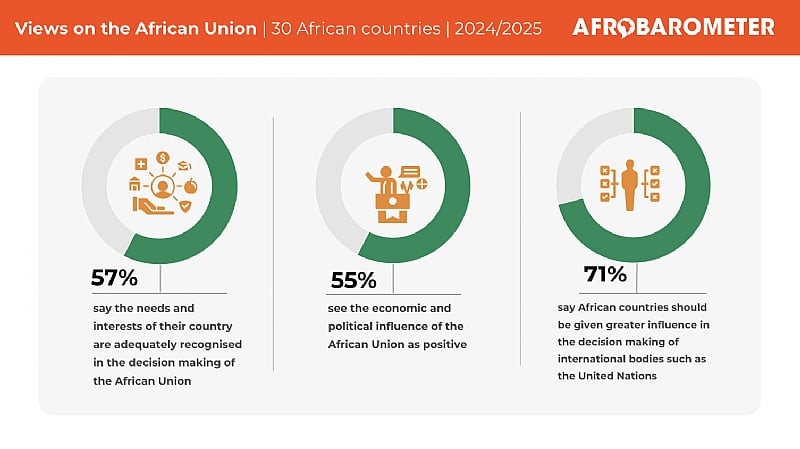A resounding majority of Africans across 30 countries surveyed by Afrobarometer express a strong desire for greater influence on the global stage. Seven out of ten Africans believe their continent should wield more power in the decision-making processes of international bodies like the United Nations. This sentiment transcends national boundaries and underscores a collective aspiration for increased African representation and impact in shaping global affairs. This yearning for enhanced international influence reflects a growing awareness of Africa’s potential and a desire to move beyond historical marginalization.
The survey also reveals a generally positive perception of the African Union (AU) and regional economic communities. A majority of respondents believe their country’s needs and interests are adequately represented within these African institutions. This positive assessment extends to the perceived economic and political influence of the AU, with over half of those surveyed viewing its impact as beneficial. This widespread approval of the AU’s role suggests a growing confidence in African-led institutions and their capacity to address continental challenges and promote development. However, pockets of skepticism exist, particularly in countries like Mali, Congo-Brazzaville, and Guinea, where a higher proportion of citizens express negative views about the AU’s influence.
While the AU enjoys broad support, the survey highlights a complex interplay of perceptions regarding external influences on African countries. China emerges as a significant player, with six in ten Africans perceiving its economic and political influence as positive. This surpasses positive perceptions of other major global actors, including the United States, the European Union, former colonial powers, India, and Russia. This positive view of China’s influence likely stems from its substantial investments in infrastructure and development projects across the continent. However, a considerable number of respondents remain neutral or express uncertainty regarding China’s impact, indicating the need for further research to understand the nuances of this complex relationship.
Interestingly, the survey reveals a hierarchy of positive perceptions regarding external influences. Following China in terms of positive influence are African regional organizations, then the United States, followed by the European Union. Former colonial powers, while still viewed positively by some, garner less favorable perceptions than the aforementioned actors. India and Russia trail behind, with the lowest levels of positive perception among the external actors included in the survey. These varying perceptions reflect the diverse historical relationships, current engagements, and economic partnerships between African countries and these external powers.
A significant finding is the considerable number of respondents who opted for a neutral stance or expressed uncertainty regarding the influence of external powers. This “don’t know” or neutral response was particularly prevalent concerning India’s influence, underscoring a lack of awareness or a more nuanced perspective that defies simple categorization. This high proportion of neutral or uncertain responses highlights the complexity of public opinion regarding external influences in Africa. It suggests that many citizens are still evaluating the long-term impacts of these relationships or perhaps feel they lack sufficient information to form a definitive opinion.
Conducted by Afrobarometer, a respected pan-African research network, the survey provides valuable insights into African perspectives on continental and global affairs. The findings, based on face-to-face interviews in respondents’ preferred languages, offer a statistically robust representation of public opinion across the 30 participating countries. The survey’s focus on issues of democracy, governance, and quality of life contributes to a deeper understanding of the evolving political landscape in Africa and the aspirations of its citizens. The data highlights the desire for greater African agency in international decision-making, a generally positive view of the African Union, and a complex tapestry of perceptions regarding the influence of external powers on the continent. These insights are crucial for policymakers, development practitioners, and international actors seeking to engage effectively with African nations and address the continent’s challenges and opportunities.














